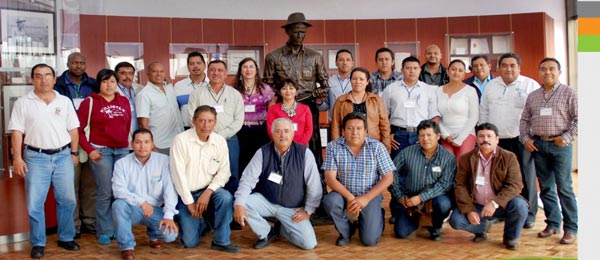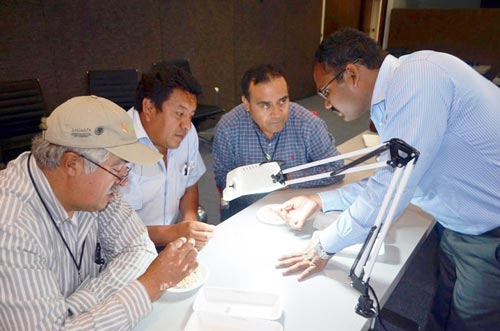By Vijay Chaikam/CIMMYT
The Sustainable Modernization of Traditional Agriculture —or MasAgro— program organized a five-day training in El Batán this month to develop skills in the use of new technologies to increase maize productivity in Mexico.

MasAgro is a collaboration between CIMMYT and Mexico’s Ministry of Agriculture, Livestock, Rural Development, Fisheries and Food (SAGARPA). Eighteen specialists from national seed companies attended, as well as two scientists from public institutions and research assistants from CIMMYT’s Global Maize Program. Scientists from the program and specialists from the Biometrics and Statistics Unit spoke on maize breeding. Researchers working in tropical, subtropical and highland areas described their methods to improve and evaluate germplasm. The presentations highlighted the superior CIMMYT germplasm for agroclimatic zones in Mexico.
Specialists addressed the identification of diseases and different approaches to manage them; improving diseaseresistant germplasm; techniques for evaluating traits such as low nitrogen and drought tolerance; the use of molecular markers and genomic selection; phenotyping methods; and statistical analysis of phenotypic and genotypic data. Discussions also addressed the importance of nutritional quality and the evaluation of quality characteristics.
The last three days centered on doubled haploid technology, which allows accelerated development of inbred lines, featuring theoretical and practical sessions. The maintenance of the haploid inducer and seed production methods were shown during the visit to the El Batán experiment station. The visit also provided firsthand information on the use of doubled haploid lines in CIMMYT’s highland breeding program. At the Agua Fría experiment station, workshop participants visited the facilities for doubling chromosomes. Practical demonstrations emphasized staff safety and the careful management of waste generated during chromosome duplication.

Participants also saw induction nurseries and the phenotypic evaluation of doubled haploid lines. A field trip to the experimental site of the National Institute for Forest, Agriculture and Livestock Research (INIFAP) – Celaya showcased the agronomic management of a treated haploid nursery (D0) and the use of doubled haploid lines in INIFAP’s maize breeding program.
 Capacity development
Capacity development 
